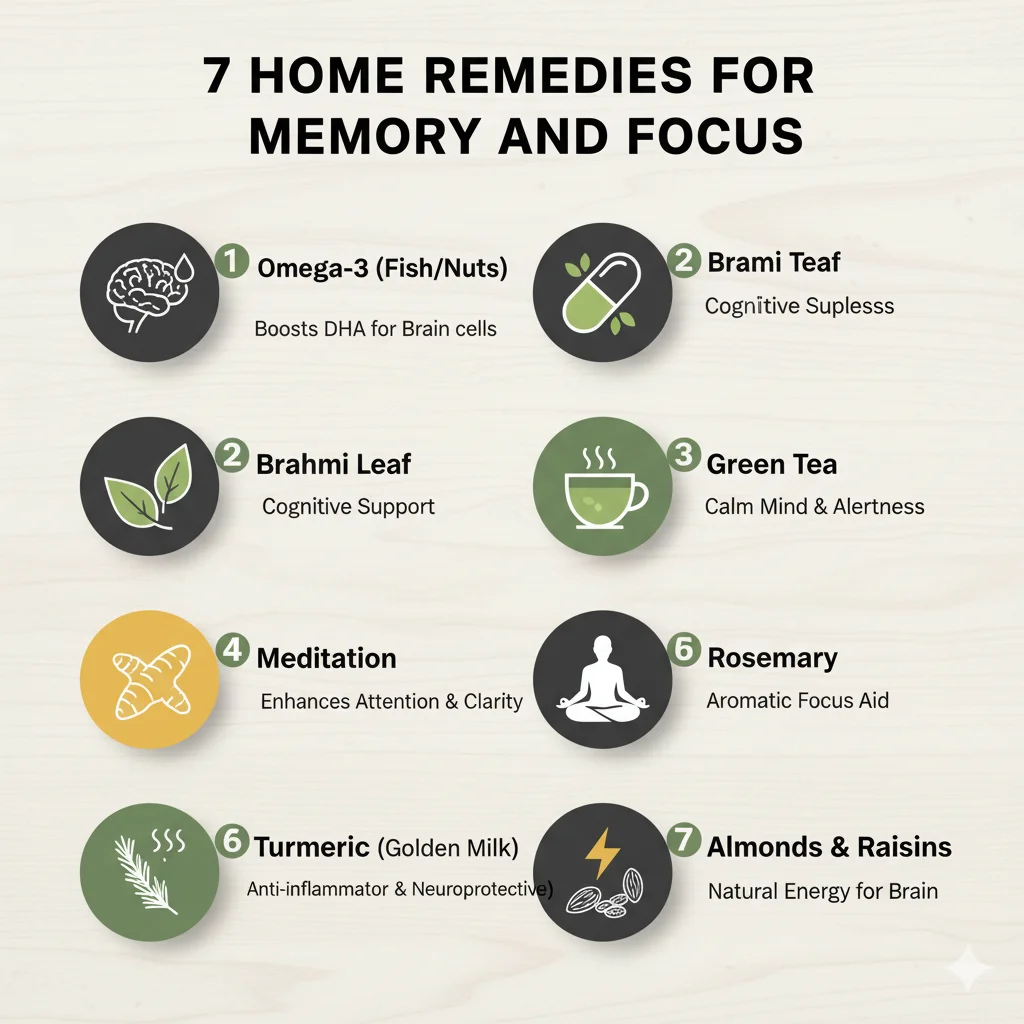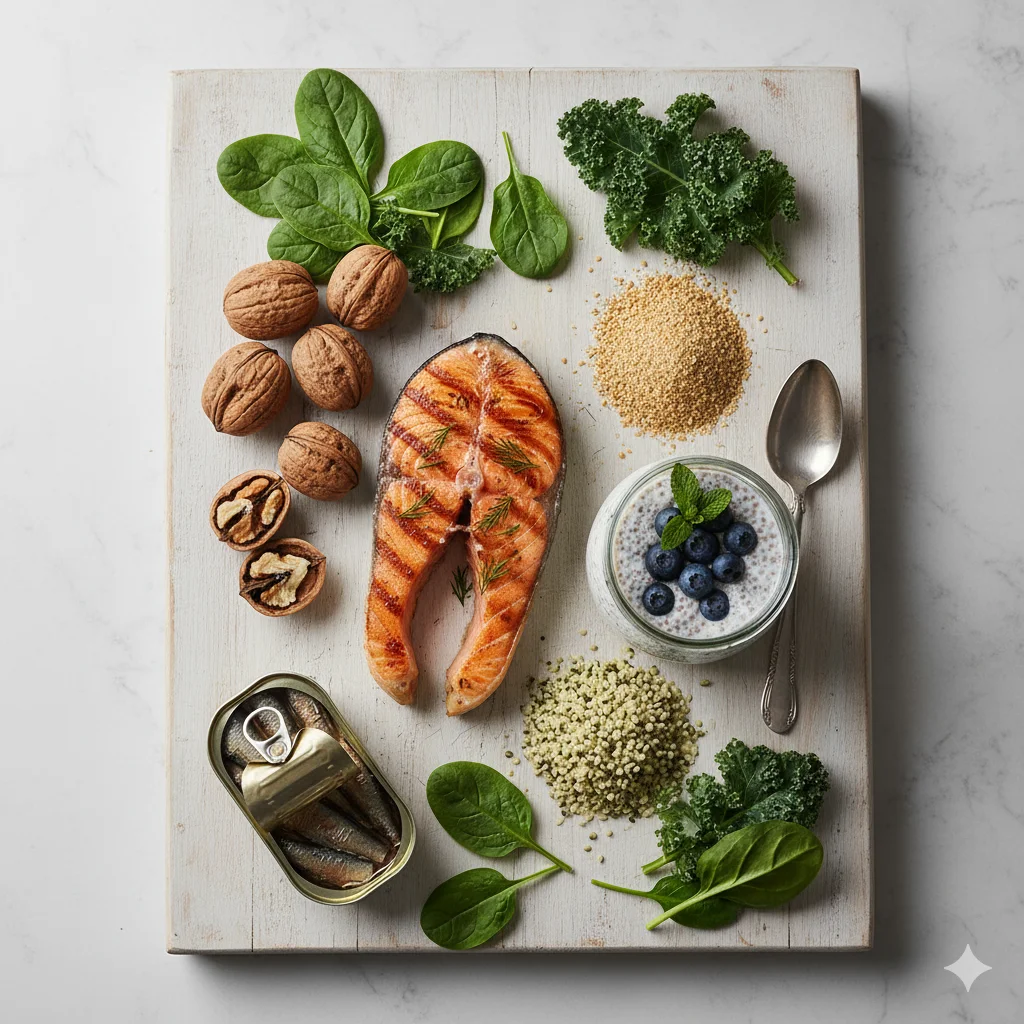Introduction: Why Your Brain Needs a Boost Today
In today’s fast-paced, always-on world, staying sharp isn’t just a luxury—it’s essential. Whether you’re juggling work deadlines, managing family life, or studying for exams, strong memory and focus are critical to getting things done effectively. Yet so many Americans report feeling mentally foggy, forgetful, and distracted—especially after long hours of screen time, poor sleep, or stress-filled days.
The reality is that modern lifestyles are tough on brain health. Constant digital stimulation, processed diets, lack of physical activity, and chronic stress all contribute to declining cognitive health. According to the CDC, over one-third of U.S. adults get less than the recommended seven hours of sleep per night—directly impacting concentration and memory retention. Meanwhile, studies show that excessive screen use can reduce attention span and impair working memory.
But here’s the good news: you don’t need prescription drugs or expensive brain supplements to reclaim your mental clarity. Nature offers powerful, accessible solutions. For centuries, traditional healing systems like Ayurveda have used simple ingredients and practices to boost memory power, enhance concentration, and support overall well-being.
That’s why this article dives deep into 7 proven home remedies for memory and focus—natural, science-backed strategies anyone in the U.S. can start using today. These home remedies for memory and focus are safe, affordable, and easy to integrate into daily routines. From omega-3 rich foods to meditation, these brain boosters help improve memory and sharpen focus without side effects.
Each remedy we’ll explore is supported by both ancient wisdom and modern research. You’ll learn how to incorporate them into meals, self-care rituals, and lifestyle habits—whether you’re a busy professional, student, or parent striving to stay alert and productive.
Let’s give your brain the nourishment it deserves. Because when your mind works better, your life works better.
The Science Behind Memory and Focus
To understand how natural remedies work, it helps to know what happens inside your brain when you remember, concentrate, or lose focus.
Your brain contains about 86 billion neurons—specialized cells that communicate through electrical impulses and chemical messengers called neurotransmitters. These signals form the foundation of cognitive health, allowing you to think clearly, solve problems, recall information, and maintain attention.
Key neurotransmitters involved in focus tips and memory include:
- Acetylcholine: Crucial for learning and memory formation
- Dopamine: Linked to motivation and reward-based focus
- Serotonin: Regulates mood and mental calmness
- GABA and L-theanine: Promote relaxation and reduce mental noise
When these chemicals are balanced and brain cells receive adequate oxygen and nutrients, your cognitive performance improves. But imbalances caused by stress, poor diet, or lack of sleep disrupt this system, leading to brain fog, forgetfulness, and difficulty concentrating.
Blood flow also plays a vital role. A healthy circulatory system delivers oxygen and glucose—the brain’s primary fuel—to neurons. Poor circulation slows processing speed and increases fatigue.
Additionally, chronic inflammation and oxidative stress damage brain tissue over time. Diets high in sugar, trans fats, and processed foods accelerate this process, increasing the risk of cognitive decline.
Now, here’s the exciting part: research shows that lifestyle changes can reverse or slow these effects—even within weeks. A landmark study published in Nature Aging found that participants who improved their nutrition, exercise, and sleep saw measurable gains in memory and executive function in just six weeks.
And nature provides potent allies. Many plant compounds act as brain boosters by protecting neurons, enhancing neural connectivity, and supporting neurotransmitter production. For example:
- Omega-3 fatty acids build cell membranes in neurons
- Antioxidants in green tea shield brain cells from damage
- Herbs like Brahmi stimulate nerve growth and repair
Even ancient practices like meditation are now validated by neuroscience. Harvard researchers found mindfulness increases gray matter in the hippocampus—the brain region responsible for memory.
So yes, genetics play a role. But your daily choices have even greater influence. By adopting natural remedies and smart lifestyle tips, you can actively improve memory and strengthen concentration at any age.
Let’s dive into seven of the most effective, science-backed home remedies for memory and focus you can start using right now.
7 Proven Home Remedies for Memory and Focus
Remedy 1: Omega-3 Rich Foods – Fuel Your Brain Naturally
When it comes to boosting brain health and supporting long-term cognitive health, few nutrients are as crucial as omega-3 fatty acids.
Omega-3s—specifically EPA (eicosapentaenoic acid) and DHA (docosahexaenoic acid)—are essential fats your body cannot produce on its own. They make up a significant portion of brain cell membranes, improving communication between neurons and reducing inflammation.
Source: National Institutes of Health (NIH) – Omega-3 Fatty Acids Fact Sheet
Numerous studies confirm their impact on memory and focus:
- A 2020 study in Neurology linked higher blood levels of omega-3s with slower cognitive aging
- Research from Harvard Medical School shows people with adequate omega-3 intake have larger brain volumes and perform better on memory tests
Top omega-3 foods available in American grocery stores include:
- Fatty fish: Wild-caught salmon, mackerel, sardines, herring
- Plant sources: Flaxseeds, chia seeds, walnuts, hemp seeds
- Supplements: High-quality fish oil or algae-based DHA (ideal for vegans)
Easy ways to add more omega-3s to your diet:
- Add ground flaxseed to oatmeal, yogurt, or smoothies
- Snack on walnuts instead of chips
- Eat grilled salmon twice a week—or use canned salmon in salads
- Make chia pudding with almond milk and berries for dessert
Tip: Pair omega-3s with vitamin E-rich foods like spinach or almonds to prevent oxidation and maximize benefits.
For those avoiding fish, algae-based DHA supplements offer an effective, sustainable alternative backed by clinical trials.
Bottom line: Omega-3s aren’t just heart-healthy—they’re fundamental to maintaining home remedies for memory and focus naturally.
Remedy 2: Brahmi (Bacopa Monnieri) – The Ancient Herb for Modern Minds
If you’ve ever felt overwhelmed, anxious, or mentally sluggish, meet Brahmi—the Ayurvedic herb gaining popularity across the U.S. wellness community.
Known scientifically as Bacopa monnieri, Brahmi has been used for over 3,000 years in Indian medicine to enhance memory power, calm the nervous system, and support learning. Today, it’s one of the most researched herbal nootropics, with dozens of clinical trials confirming its cognitive health benefits.
Source: NCBI – Effects of Bacopa monnieri on Cognitive Function in Older Adults
A key study published in Pharmacology Biochemistry and Behavior found that adults taking Brahmi daily for 12 weeks showed significant improvements in verbal learning, memory retention, and processing speed compared to placebo.
How does it work?
Brahmi contains active compounds called bacosides, which repair damaged neurons, stimulate nerve cell regeneration, and reduce oxidative stress in the brain. It also lowers cortisol—the stress hormone—helping you stay focused under pressure without feeling jittery.
Unlike caffeine or stimulants, Brahmi promotes steady, sustained mental clarity without crashes.
How to Use Brahmi Safely in the U.S.
Available forms:
- Capsules or tablets: Standardized extracts (often 20% bacosides), taken once or twice daily
- Powder: Can be mixed into warm milk, smoothies, or teas
- Liquid tinctures: Fast-absorbing, ideal for quick results
Recommended dose: 300–450 mg per day of standardized extract.
Start low to assess tolerance. Some users experience mild digestive discomfort initially, but this usually resolves within a few days.
Note: Brahmi may interact with thyroid medications or sedatives. Always consult your doctor before starting, especially if pregnant, nursing, or on medication.
Many U.S. supplement brands now carry third-party tested Brahmi products. Look for labels like “non-GMO,” “gluten-free,” and “verified by USP” for quality assurance.
Home remedies for better digestion have transformed the lives of millions of Americans who struggle with daily digestive discomfort.
With consistent use (typically 4–6 weeks), many notice improved focus, reduced mental fatigue, and better recall—making Brahmi a true powerhouse among home remedies for memory and focus.
Remedy 3: Green Tea – Calm Alertness in a Cup
Looking for a gentler alternative to coffee that still sharpens your mind? Enter green tea—a beloved beverage packed with focus tips in every sip.
Unlike coffee, which gives you a spike-and-crash cycle, green tea delivers balanced energy thanks to two key ingredients: L-theanine and caffeine.
Together, they create a unique synergy:
- Caffeine boosts alertness and reaction time
- L-theanine promotes relaxation without drowsiness, reducing anxiety and mental chatter
Studies show this combo enhances alpha brain wave activity—linked to relaxed focus and creativity. Researchers at the University of Basel found participants who consumed green tea extract showed increased connectivity in brain regions tied to working memory.
Green tea is also rich in antioxidants like EGCG (epigallocatechin gallate), which protects neurons from damage and may slow age-related cognitive decline.
How Americans Can Enjoy More Green Tea
You don’t need to drink plain tea to benefit. Try these tasty, easy ways:
- Matcha latte: Whisk matcha powder with hot water and steamed oat milk
- Iced green tea: Brew strong green tea, chill, and serve with lemon and mint
- Smoothie booster: Add cooled green tea or matcha to fruit smoothies
- Cooking liquid: Use brewed green tea instead of water in soups or grains
Popular U.S. brands like Harney & Sons, Bigelow, and Traditional Medicinals offer organic options in supermarkets and online.
For maximum effect, aim for 1–3 cups per day. Avoid late-day consumption to protect sleep.
Whether you’re studying, preparing for a meeting, or need a midday reset, green tea offers clean, calm energy—making it one of the simplest yet most effective home remedies for memory and focus.
Remedy 4: Meditation & Mindfulness – Train Your Brain Like a Muscle
Imagine strengthening your attention span the way you’d strengthen your arms—with regular practice. That’s exactly what meditation does.
Meditation isn’t just spiritual—it’s a neuroscience-backed tool for cognitive health. Regular mindfulness practice literally reshapes your brain, increasing gray matter in areas responsible for memory, emotional regulation, and decision-making.
Harvard researchers found that just eight weeks of daily mindfulness meditation led to measurable growth in the hippocampus (the memory center) and shrinkage in the amygdala (the fear/stress hub). Participants reported better focus, less anxiety, and improved mental clarity.
Why does it work?
Mindfulness trains your brain to return to the present moment—over and over. Every time you notice your mind wandering and gently bring it back, you’re doing a “mental push-up” for your attention muscles.
Over time, this builds resilience against distractions, improves working memory, and reduces mental fatigue.
Quick 5-Minute Meditation Routine for Busy Professionals
No time? No problem. Here’s a simple, science-backed routine:
- Sit comfortably, feet flat on floor, hands on knees.
- Close your eyes or soften your gaze.
- Focus on your breath—feel the air entering and leaving your nostrils.
- When your mind wanders (and it will), gently say “thinking” and return to the breath.
- Continue for 5 minutes. Use a timer or guided app (like Insight Timer or Calm).
Do this first thing in the morning, during lunch, or before bed. Even short sessions compound over time.
Bonus: Combine with walking (mindful walking), journaling, or breathing exercises for deeper impact.
This remedy costs nothing, requires no equipment, and fits into even the busiest schedules. If you want to boost concentration naturally, meditation might be the most underrated—and most powerful—tool you already have access to.
Remedy 5: Turmeric with Black Pepper – The Golden Brain Protector
Spice up your brain health with one of India’s oldest superfoods: turmeric.
At the heart of turmeric’s power is curcumin, a potent anti-inflammatory and antioxidant compound shown to cross the blood-brain barrier and protect neurons from damage.
Multiple studies suggest curcumin supports cognitive health by:
- Reducing brain inflammation linked to depression and dementia
- Clearing amyloid plaques associated with Alzheimer’s disease
- Boosting levels of BDNF (Brain-Derived Neurotrophic Factor), a protein that fuels neuron growth
One UCLA trial found older adults who took curcumin supplements for 18 months had significant improvements in memory and mood compared to those on placebo.
If you want to increase hemoglobin naturally, this guide is for you. No pills. No injections. Just real food, smart habits, and time-tested Ayurvedic wisdom that works.
But here’s the catch: curcumin is poorly absorbed on its own.
That’s where black pepper comes in. Piperine, the active ingredient in black pepper, increases curcumin absorption by up to 2,000%.
So always pair turmeric with a pinch of black pepper—and a fat source (like coconut oil or milk)—to unlock its full potential.
Golden Milk Recipe for U.S. Readers
Try this cozy, delicious drink before bedtime:
Ingredients:
- 1 cup unsweetened almond or oat milk
- ½ tsp ground turmeric
- Pinch of black pepper
- ½ tsp cinnamon
- ½ tsp coconut oil or ghee
- Optional: 1 tsp honey or maple syrup
Instructions:
- Heat milk in a small saucepan over medium heat.
- Whisk in all ingredients until well blended.
- Simmer for 3–5 minutes (don’t boil).
- Pour into a mug and enjoy warm.
Drink nightly for best results. Many users report deeper sleep, clearer mornings, and reduced brain fog.
You can also add turmeric to scrambled eggs, soups, stir-fries, or smoothies. Just remember: black pepper is non-negotiable for absorption.
With its vibrant color and powerful benefits, turmeric is more than a spice—it’s a cornerstone of natural brain health and home remedies for memory and focus.
Remedy 6: Rosemary Aroma Therapy – Smell Your Way to Sharper Thinking
Did you know the scent of rosemary can actually boost your memory?
It sounds like folklore—but science backs it. Researchers at Northumbria University discovered that exposure to rosemary essential oil significantly improved prospective memory (remembering to do something in the future) and overall cognitive performance in test subjects.
The magic lies in 1,8-cineole, a volatile compound in rosemary aroma that enters the bloodstream through inhalation and acts on neurotransmitters related to attention and learning.
In another study, students in classrooms infused with rosemary scent scored 5–7% higher on memory tests than those in unscented rooms.
This makes rosemary one of the most fascinating natural remedies for instant focus enhancement.

How to Use Rosemary for Cognitive Health
Easy ways to harness its power:
- Diffuser: Add 3–5 drops of pure rosemary essential oil to a diffuser while working or studying
- Inhalation: Place a drop on a tissue or cotton ball and breathe deeply
- Shower bomb: Put dried rosemary or a few drops of oil in a muslin bag in your shower
- Tea: Steep fresh or dried rosemary leaves in hot water for a fragrant, antioxidant-rich drink
- Cooking: Use fresh sprigs in roasted potatoes, meats, or bread
Look for therapeutic-grade essential oils labeled “100% pure” and store them away from sunlight.
Caution: Pregnant women and those with epilepsy should avoid concentrated rosemary oil. Consult your doctor if unsure.
For office workers, students, or anyone needing a mental edge, keeping a bottle of rosemary oil at your desk could be a game-changer.
It’s not magic—it’s aromatherapy meeting neuroscience.
Remedy 7: Almonds & Raisins (Soaked Overnight) – A Classic Brain Tonic
In Ayurvedic tradition, soaked almonds and raisins are known as a medhya rasayana—a rejuvenating tonic for the mind.
While it may sound simple, this age-old combination packs a serious nutritional punch for improve memory and sustained energy.
Why Soak Them?
Soaking nuts and dried fruits overnight neutralizes enzyme inhibitors and phytic acid, making their nutrients easier to digest and absorb. It also softens them, aiding gut health.
Nutritional Benefits:
| Almonds | Vitamin E (antioxidant), healthy fats, magnesium, protein |
| Raisins | Iron (oxygenates blood), B vitamins, natural sugars for energy |
Vitamin E in almonds protects brain cells from oxidative damage, while iron in raisins ensures optimal oxygen delivery to the brain—critical for alertness and concentration.
Plus, the slow-release energy from this combo prevents blood sugar spikes, avoiding the crash that follows sugary snacks.
Easy Recipe: Almond-Raisin Smoothie
Perfect for breakfast or post-workout fuel.
Ingredients:
- 6 soaked almonds (peeled)
- 10 soaked raisins
- 1 banana
- 1 cup almond milk
- Dash of cinnamon
- Ice (optional)
Blend and enjoy!
Alternatively, eat them straight after soaking—just rinse well.
Many Indian-American households serve this mix to children during exam season. Now, modern science confirms what tradition already knew: whole foods, prepared mindfully, are powerful brain boosters.
Try this remedy daily for 2–4 weeks and notice subtle shifts in mental stamina and clarity.
Lifestyle Hacks to Support These Remedies
Natural remedies work best when supported by healthy habits. Think of them as teammates on your brain-optimization squad.
Even the best home remedies for memory and focus won’t reach their full potential if you’re chronically sleep-deprived, stressed, or sedentary.
Here are four lifestyle tips to amplify your results:
1. Prioritize Sleep Optimization
Your brain consolidates memories during deep sleep. Skimp on rest, and you weaken recall, focus, and emotional control.
Aim for 7–9 hours nightly. Create a wind-down ritual:
- Dim lights an hour before bed
- Avoid screens (blue light suppresses melatonin)
- Try herbal teas like chamomile or passionflower
Consistency matters more than perfection. Going to bed and waking up at the same time—even on weekends—regulates your circadian rhythm and boosts daytime alertness.
2. Digital Detox for Mental Clarity
Constant multitasking fragments your attention. A University of California study found it takes an average of 23 minutes to refocus after a single distraction.
Practice focused work blocks:
- Use the Pomodoro Technique (25 min work + 5 min break)
- Turn off non-essential notifications
- Designate “no-phone zones” (e.g., dinner table, bedroom)
Even one hour of screen-free time each day can restore mental bandwidth.
3. Move for Brain Oxygen Flow
Exercise increases blood flow to the brain and stimulates BDNF production—essentially fertilizing your neurons.
You don’t need intense workouts. Just 20–30 minutes of brisk walking, yoga, or dancing most days can lift your mood and sharpen thinking.
Yoga, in particular, combines physical movement with breath and mindfulness—triple threat for cognitive health.
4. Stay Hydrated
Even mild dehydration (as little as 1–2%) impairs concentration, memory, and reaction time.
Carry a reusable water bottle. Infuse it with lemon, cucumber, or berries for flavor.
Aim for pale yellow urine as a hydration benchmark.
Pair these lifestyle tips with the seven remedies above, and you’ll create a holistic environment where your brain can thrive—not just survive.

FAQs: People Also Ask (AEO Section)
What is the best home remedy for improving focus fast?
One of the quickest-acting home remedies for memory and focus is green tea. Thanks to its L-theanine and caffeine combo, it provides calm alertness within 20–30 minutes—without jitters. Sipping a cup while working or studying can instantly sharpen attention. Pair it with a few deep breaths or a short walk for even better results.
How long does it take for home remedies for memory and focus to work?
Most natural remedies require consistency. You may notice subtle improvements in concentration within a week (like with green tea or rosemary aroma). However, deeper cognitive changes—such as enhanced memory retention or reduced brain fog—typically take 4 to 8 weeks of daily use. Brahmi, omega-3s, and meditation fall into this category. Patience and routine are key.
Are Brahmi supplements safe in the U.S.?
Yes, Brahmi (Bacopa monnieri) supplements are widely available and generally considered safe for most adults when taken at recommended doses (300–450 mg daily). They’re sold in health food stores and online retailers like iHerb, Amazon, and Thrive Market. Choose brands with third-party testing and clear labeling. However, consult your healthcare provider if you’re pregnant, have a thyroid condition, or take sedatives.
Can green tea improve memory in students?
Absolutely. Multiple studies show green tea enhances working memory and cognitive performance, especially in young adults. Its antioxidants protect brain cells, while L-theanine reduces test anxiety. Students who replace soda or energy drinks with green tea often report better focus during lectures and improved recall during exams.
What foods sharpen memory quickly?
Foods rich in omega-3s, antioxidants, and healthy fats deliver fast cognitive benefits. Top picks include:
- Walnuts and flaxseeds (omega-3s)
- Blueberries (antioxidants)
- Fatty fish like salmon
- Dark chocolate (flavonoids)
- Eggs (choline for acetylcholine production)
Combine them in meals like a salmon bowl with avocado and greens for a brain-boosting powerhouse.
Which is better for concentration: meditation or caffeine?
Both have benefits, but they work differently.
- Caffeine gives a rapid, short-term boost in alertness.
- Meditation builds long-term focus stamina and reduces mental noise.
For immediate tasks, caffeine (like green tea) helps. For sustained productivity and resilience, meditation wins. Ideally, use both strategically—e.g., meditate in the morning, then enjoy green tea during work sessions.
Do omega-3 supplements really work for cognitive health?
Yes. Numerous clinical trials confirm that omega-3 supplementation—especially DHA—supports brain health, slows cognitive aging, and improves mood. While whole foods are preferred, supplements are effective for those who don’t eat fish regularly. Look for molecularly distilled, mercury-free fish oil or algae-based options.
What daily routine can boost memory naturally?
A simple, science-backed routine:
- Morning: 5-minute meditation + green tea
- Breakfast: Oatmeal with walnuts, chia seeds, and blueberries
- Lunch: Grilled salmon salad with olive oil dressing
- Afternoon: Walk outside + rosemary essential oil inhalation
- Dinner: Turmeric-spiced vegetables with black pepper
- Bedtime: Golden milk + 7+ hours of sleep
Add soaked almonds and raisins as a snack, and you’ve built a full-day protocol for peak cognitive health.
For more health & welness topic avilable on Health Morph
Conclusion: Take Charge of Your Mental Clarity
We live in a world that demands more from our brains than ever before. But instead of burning out, you can build resilience—one natural choice at a time.
The 7 proven home remedies for memory and focus we’ve explored aren’t quick fixes. They’re time-tested, science-supported strategies that honor your body’s innate ability to heal and thrive.
From loading up on omega-3 foods like salmon and flaxseeds, to sipping golden milk with turmeric, to practicing just five minutes of mindfulness—you now have a toolkit to upgrade your brain health naturally.
These remedies aren’t exotic or expensive. They’re accessible, practical, and designed for real American lives—whether you’re parenting, working remotely, or returning to college.
Remember: improve memory and concentration isn’t about perfection. It’s about consistency. Small actions, repeated daily, create lasting change.
So pick one remedy—just one—to start with today.
Maybe it’s swapping your afternoon soda for green tea. Or adding rosemary to your cooking. Or setting a reminder to soak almonds each night.
Whatever you choose, commit to it for 21 days. Track how you feel. Notice the shifts in your energy, clarity, and confidence.
And when you’re ready, add another.
Because your brain is your greatest asset. And with the right care, it can stay sharp, focused, and resilient for decades to come.
👉 Call to Action: Which home remedy for memory and focus will you try first? Share your choice in the comments or with a friend. Let’s build a community of stronger minds—together.







Leave a Reply